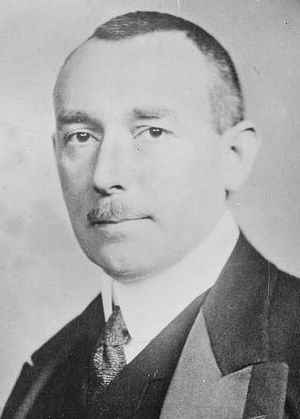Karl Helfferich facts for kids
Quick facts for kids
Karl Helfferich
|
|
|---|---|

Karl Helfferich
|
|
| Vice-Chancellor of the German Empire | |
| In office 22 May 1916 – 24 October 1917 |
|
| Chancellor | Theobald von Bethmann Hollweg Georg Michaelis Georg von Hertling |
| Preceded by | Clemens von Delbrück |
| Succeeded by | Friedrich von Payer |
| Secretary of State of the Interior | |
| In office 22 May 1916 – 23 October 1917 |
|
| Chancellor | Theobald von Bethmann Hollweg Georg Michaelis Georg von Hertling |
| Preceded by | Clemens von Delbrück |
| Succeeded by | Max Wallraf |
| Secretary of State of the Treasury | |
| In office 21 January 1915 – 22 May 1916 |
|
| Chancellor | Theobald von Bethmann Hollweg |
| Preceded by | Hermann Kühn |
| Succeeded by | Siegfried von Roedern |
| Personal details | |
| Born |
Karl Theodor Helfferich
22 July 1872 Neustadt an der Weinstraße, Rhineland-Palatinate |
| Died | 23 April 1924 (aged 51) Bellinzona, Switzerland |
| Nationality | German |
| Spouses | Annette, b. von Siemens |
| Alma mater | University of Berlin University of Munich University of Strasbourg |
| Occupation | Lawyer, economist |
Karl Theodor Helfferich (born July 22, 1872 – died April 23, 1924) was an important German politician, economist, and financier. He was born in Neustadt an der Weinstraße in the Palatinate region of Germany.
Contents
Karl Helfferich's Early Life and Career
Karl Helfferich studied law and political science at several universities. These included the University of Munich, University of Berlin, and University of Strasbourg. After his studies, he taught at the University of Berlin. He also taught at a special government school. This school focused on colonial politics and languages from the East.
Joining the Diplomatic Service
In 1902, Helfferich began a career in diplomacy. He quickly became a key figure in the German government's economic plans. In 1906, he was made a director of the Baghdad Railway. This railway project was a big deal and was funded by the powerful Deutsche Bank. By 1908, he became the chairman of the board for Deutsche Bank in Berlin.
Helfferich's Role in World War I
After the Balkan Wars ended in 1913, Karl Helfferich was Germany's financial representative. He attended an important international meeting. He later served as the Secretary for the Treasury from 1916 to 1917. He was known for how he planned to pay for World War I. Instead of raising taxes, he decided to use loans. He believed Germany would win the war. He also expected Germany to make the losing countries pay a lot of money. Helfferich also held the position of Vice-Chancellor. He served under Chancellors Georg Michaelis and Georg von Hertling.
Supporting Anti-Socialist Groups
During the November Revolution, Helfferich supported Eduard Stadtler. Stadtler started the Anti-Bolshevist League. Helfferich helped fund this group. The League received money from German industries. This money was used for propaganda. It also went to groups that opposed the socialist movement.
After the War and Political Opposition
After the Treaty of Brest-Litovsk, Helfferich became Germany's Ambassador to Russia. He took over after the previous ambassador was killed. In 1920, he was elected to the Reichstag, which was the German parliament. He became a leader of the conservative and monarchist groups. These groups were known as the Deutsch-Nationalen.
Opposing Reparations
Helfferich strongly opposed reparations. These were payments Germany had to make after the war. He also disagreed with the Versailles Treaty. He often spoke out against politicians who supported these payments. One famous example was his public disagreement with Matthias Erzberger in 1920.
Defending Wartime Policies
Karl Helfferich was a leading politician in the German National People's Party (DNVP). He gave strong speeches against the new German republic. In June 1920, he was chosen to speak for a parliamentary committee. This committee was looking into Germany's policies during the war. Helfferich defended these policies.
Economic Ideas and Final Years
During the hyperinflation of 1923, Helfferich came up with a new idea for currency. He suggested a "rye currency." Its value would be linked to the price of rye and other farm products. His idea was not fully adopted. However, some parts of his plan were used in the successful German Rentenmark. This new currency started in November 1923. At the end of 1923, Helfferich wanted to become the head of the German central bank. But he was not chosen for the job.
Karl Helfferich died in a train accident. This happened near Bellinzona, Switzerland, on April 23, 1924.
Karl Helfferich's Legacy
Helfferich wrote many books and articles. Most of his writings were about economics and politics.
Works by Karl Helfferich
- The Reform of German Finance, 1897
- Studies on Money and Banking, 1900
- Money, 1903
- Germany's National Wealth 1888-1913, 1915
- Speeches and Essays from the War, 1917
- Do Away with Erzberger!, 1919
- The World War (3 volumes), 1919
See also
 In Spanish: Karl Helfferich para niños
In Spanish: Karl Helfferich para niños
 | Frances Mary Albrier |
 | Whitney Young |
 | Muhammad Ali |

